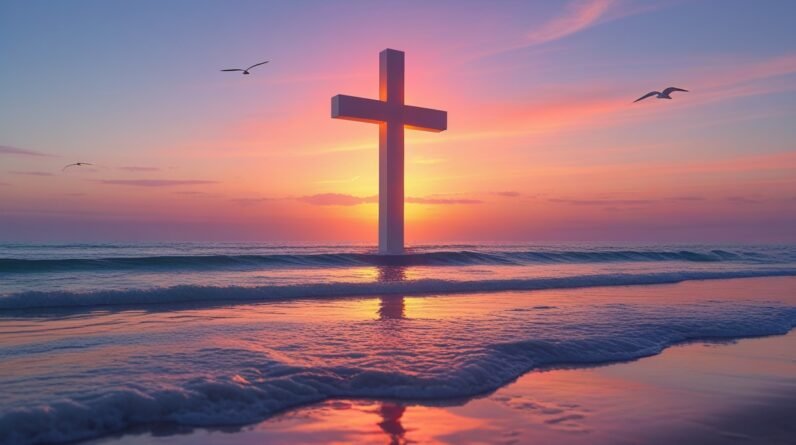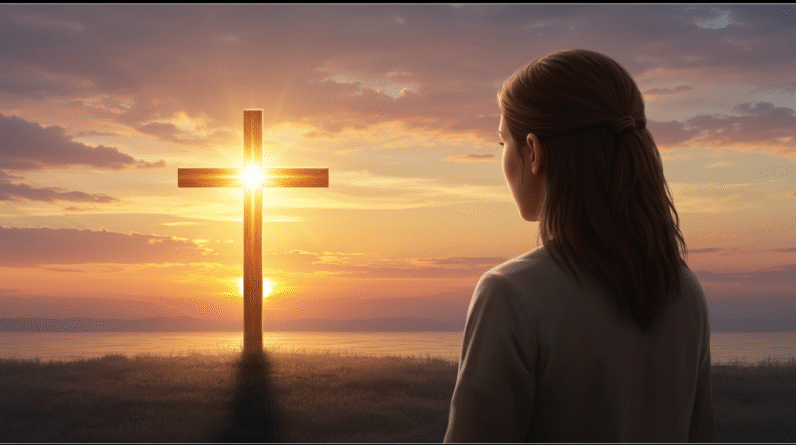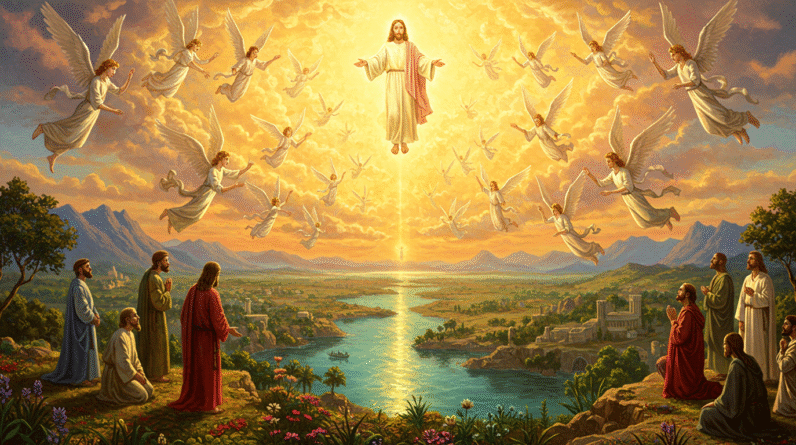The New Creation: God’s Plan To Make All Things New
You’ve probably heard phrases like “born again,” “new life,” or “restoration” tossed around in church conversations, sermons, or Bible studies. But at the center of Christian hope is a bigger, bolder reality: the new creation in Christ. This isn’t just about how God changes one person’s heart; it’s about how God intends to remake the whole world—people, relationships, and the entire cosmos—into something healed, beautiful, and forever aligned with His purposes.
Mean by “New Creation”?
When you say the words new creation in Christ, you’re pointing to God’s promise to bring renewal that’s both personal and cosmic. On one level, it means that when you trust Jesus, you’re made new inside—your old, self-centered patterns begin to die and a fresh life starts. On a larger level, it says that God isn’t finished with the world; He will restore and transform all things. That double emphasis—personal transformation and cosmic renewal—is central to the Bible’s teaching about God’s future and His present work.
The Core New Testament Statement: 2 Corinthians 5:17
The phrase that often anchors this whole conversation is Paul’s short, electrifying sentence: “Therefore, if anyone is in Christ, the new creation has come: The old has gone, the new is here!” That declaration captures the essence of the new creation in Christ: union with Jesus changes everything about your status before God and points toward the renewal of all things. See 2 Corinthians 5:17.
How the Apostle Paul Frames Newness
Paul returns to the theme of newness in several places. He contrasts outward rituals and human traditions with the inward reality that actually matters. For example, he writes that what counts is the new creation, not external markers like circumcision. When you read passages like Galatians 6:15, you see Paul’s priority: transformation in Christ outweighs religious observances. This helps you understand that the new creation in Christ reshapes identity, not just behavior.
The Cosmic Scope: Revelation and the Promise of a New Heaven and Earth
If you want to see the grandest picture of God’s restoration project, look to Revelation. John records a vision of a new heaven and a new earth, where pain, death, and sorrow are gone and God dwells with His people in a renewed creation. That future hope shows you that God’s plan isn’t limited to human souls; it includes the entire created order being made new. Read the vision in Revelation 21:1–5.
Old Testament Roots: Prophetic Promises of Renewal
You might think new creation is only a New Testament idea, but the Old Testament pulses with renewal language, too. Prophets like Isaiah spoke of God doing a new thing—creating a future where former troubles are eclipsed and restoration flows. For instance, Isaiah’s promise of a new heaven and new earth fills out the continuity between God’s covenant faithfulness in the Old Testament and the revelation of Christ in the New. See Isaiah 65:17.
The Mechanism: How Does God Make Things New?
When you ask how God accomplishes the new creation in Christ, you’re asking about God’s methods—what He does and how He does it. The Bible points to several connected actions: Christ’s incarnation, life, death, and resurrection; the outworking presence of the Holy Spirit; and the ongoing processes of regeneration, sanctification, and eventual glorification. Each of these plays a role in renewing individual hearts and the wider creation.
Christ’s Work: Reconciliation and Cosmic Renewal
Jesus’ life, death, and resurrection are at the center of God’s renewal plan. Paul explains that through Christ, God reconciles all things to Himself, making peace through Jesus’ blood on the cross. This reconciliation isn’t merely about fixing individual relationships with God; it has cosmic significance. The passage that beautifully articulates this scope is Colossians 1:15–20. When you read it, you’ll see that Christ is presented as the agent of cosmic reconciliation.
The Role of the Holy Spirit: New Heart, New Power
God’s Spirit is the active agent of renewal inside you and across creation. You experience the Spirit’s renewal as you are given a new heart, empowered to live in a way that reflects God’s kingdom. The Spirit brings life where there was death, nudges your conscience, convicts, comforts, and transforms. Ezekiel anticipated this when God promised a new heart and spirit, and the New Testament connects that promise to the Spirit’s work in believers. See Ezekiel 36:26 and consider Titus 3:5 for how regeneration and renewal are described in the New Testament.
Regeneration, Sanctification, Glorification: A Triad of Renewal
To make the concept practical, think of three phases in the life of a believer and the world:
- Regeneration: Being born again—God gives you new life. See John 3:3–7.
- Sanctification: The long process of becoming more like Jesus—God’s ongoing work in you. You see this theme throughout Paul’s letters, such as Philippians 1:6, where God continues the good work He began in you.
- Glorification: The completion when Christ returns—your body and the creation itself are fully restored. Read about the resurrection hope in 1 Corinthians 15:42–44.
These stages show you that new creation in Christ is progressive and sure: God starts a process in you and the world that He will finish.
Creation Groans: How Suffering Points to Future Restoration
You might struggle reconciling suffering with the idea of a renewed world. Paul addresses this directly in Romans 8, where he describes creation as “groaning” in labor pains, waiting for freedom and the full revelation of God’s children. When you read Romans 8:18–23, you’re shown a theology of suffering that doesn’t ignore pain but gives it meaning: current suffering is temporary and points you toward a triumphant renewal.
Resurrection as the Seed of New Creation
The resurrection of Jesus is the decisive event that guarantees the new creation in Christ. His rising from the dead is not just a model for individual resurrection; it’s the firstfruits of what God will do for the whole creation. Paul emphasizes that Christ’s resurrection breaks the grip of death and sets the pattern for the renewal of bodies and the world. Read 1 Corinthians 15:20–22 to see how the resurrection is framed as the beginning of cosmic renewal.
Living in the Overlap: Already and Not Yet
You live in an “already and not yet” tension. The new creation in Christ is already present in your life because the Spirit dwells in you and because you’re united with Jesus. At the same time, the fullness of the new creation is not yet manifest; it awaits Christ’s return. This tension shapes how you handle both joy and disappointment: you celebrate God’s current work and remain patient for the final unveiling. The New Testament speaks to this tension across many passages, like 2 Corinthians 4:16–18.
Practical Implications: How New Creation Shapes Your Identity
If you grasp what it means to be part of the new creation in Christ, your self-understanding shifts. Your primary identity is no longer defined by past failures, social status, or accomplishments, but by union with Christ. This isn’t self-help optimism; it’s a theologically anchored identity shift that affects how you relate to God, others, and yourself. For example, Paul’s statement that you are God’s workmanship—created in Christ Jesus to do good works—gives you a dignity rooted in God’s purpose, not your performance. See Ephesians 2:10.

How New Creation Shapes Your Relationships
New creation in Christ transforms relationships by centering them on reconciliation, forgiveness, and restoration. If you belong to the new creation, you become an agent of peace and reconciliation, reflecting the heart of God who reconciled the world to Himself in Christ. That has concrete implications: you pray for enemies, pursue forgiveness, work for justice, and build communities that mirror God’s reconciling love. The theological basis for this calling comes from passages like 2 Corinthians 5:18–19.
Ethics and Justice: New Creation and Social Concern
You might wonder whether the new creation has anything to say about poverty, injustice, and environmental degradation. It does. If God intends to restore the whole creation, then you have a responsibility to participate in that restoration. This translates into active concern for the marginalized, the righting of wrongs, and stewardship of creation. Scripture repeatedly connects God’s care for the poor and His plan for a renewed world. Verses that underline the social dimensions of God’s work include Micah 6:8 and the broader prophetic calls to justice.
Creation Care: Faith and the Environment
Part of living in light of the new creation is stewarding the environment. If creation matters to God and will one day be made new, then it matters to you now. Caring for the earth is not merely a modern political stance; it’s an extension of the biblical narrative that sees the world as God’s handiwork and part of His redemptive plan. You can find theological grounding for creation care in texts like Genesis 2:15 (human stewardship) and the cosmic restoration language throughout Scripture.
Worship and the New Creation
Worship in the new creation will be unmediated and eternal. Until then, your worship is both a foretaste and a training ground for that future reality. Worship teaches you to see the world through God’s eyes and aligns your heart with His purposes. The book of Revelation offers a glimpse of future worship where every creature praises God and the Lamb, pointing to the all-encompassing renewal you long for. See Revelation 5:13 for a sense of cosmic praise.
Hope That Sustains: Facing Death and Loss
One of the most practical comforts of the new creation is how it reorients your hope in the face of death and loss. Belief in the new creation gives you confidence that death is not the end and that God will ultimately make all things right. Paul’s words about our imperishable hope and the promise of resurrection provide the anchor you need when grief feels overwhelming. Read 1 Thessalonians 4:13–18 to see how Christian hope addresses death.
Mission: Proclaiming and Participating in Renewal
Your participation in God’s new-creation project has a missionary dimension. You don’t keep the news of renewal to yourself; you’re called to proclaim it and live it out. Evangelism, social action, and community-building are all ways you participate in God’s work of making things new. Paul frames this mission as being entrusted with the message of reconciliation, and you’re part of that entrusted mission. See 2 Corinthians 5:20.
Unity and Diversity in the New Creation
Another important angle is how the new creation in Christ balances unity and diversity. The renewed world will be a place where people from every tribe and nation worship together in unity, yet the rich diversity of God’s made world is celebrated, not erased. Revelation offers images of multiethnic worship and access to God for all peoples, which you can anticipate now by pursuing unity that honors genuine diversity. Consider Revelation 7:9 for a picture of this inclusive hope.
Spiritual Formation: Becoming a Person of New Creation
Spiritual formation is how you grow into your identity as someone who belongs to the new creation in Christ. Spiritual disciplines—prayer, Scripture reading, community, sacrificial service—help reshape your habits, affections, and priorities so your life increasingly reflects the reality you belong to. This is the daily, often slow work of becoming more like Jesus, which Paul calls participating in the “renewal” God performs. Look at Romans 12:2 for the call to be transformed by renewing your mind.
The Church’s Role as a Foretaste of the New Creation
The local church is intended to be a foretaste of the new creation—an embodied community where reconciliation, sacrificial love, worship, and service are practiced. In the church, you can experience the kinds of transformed relationships that will characterize the renewed world. The New Testament describes the church as a community of new beings in Christ, and when you engage in church life, you’re participating in that reality now. See Acts 2:42–47 for an early picture of a community living out renewed life.
Obstacles and Misunderstandings
It’s easy to misunderstand the new creation in Christ. Some reduce it to private spirituality and ignore social responsibility; others make it only about public reform without attending to inner transformation. You can avoid these traps by remembering the holistic biblical vision: God renews hearts and the cosmos. Also, newness doesn’t mean instant perfection—there’s a patient work of God and human participation involved. Keep balancing the truth about sin with hope in God’s ongoing, graceful work.
Living in Hope: Practical Steps
Here are a few practical, simple steps you can take to live in light of the new creation in Christ:
- Cultivate a rhythm of prayer and Scripture that reorients your desires toward God’s kingdom.
- Engage in a community that holds you accountable and practices reconciliation.
- Serve those in need and steward creation as signs of God’s coming renewal.
- Practice lament and hope together, acknowledging suffering but anchoring in God’s promise.
These steps help you live as a person who already belongs to the new creation, while waiting for the day when all things are finally made new.
The Final Fulfillment: When All Things Are Made New
The Bible’s ultimate promise is that God will complete His renewal project. Revelation’s sweeping vision of a new heaven and new earth is the final word: God will wipe away every tear, and death will be no more. That future completion is where your hope is headed, and all the present work and waiting find their meaning in that promise. See Revelation 21:3–4 for the assurance of God’s final restoration.
Conclusion: Why This Matters for You
Understanding the new creation in Christ reshapes everything—your identity, your mission, and how you handle suffering. It gives you a grand narrative to live into: God is making all things new, and you’re invited to participate. That invitation transforms day-to-day choices, relationships, and how you hope for the future. When you anchor your life in this reality, you start to see your actions as part of a larger story—God’s story of renewal.
Explore More
For further reading and encouragement, check out these posts:
👉 7 Bible Verses About Faith in Hard Times
👉 Job’s Faith: What We Can Learn From His Trials
👉 How To Trust God When Everything Falls Apart
👉 Why God Allows Suffering – A Biblical Perspective
👉 Faith Over Fear: How To Stand Strong In Uncertain Seasons
👉 How To Encourage Someone Struggling With Their Faith
👉 5 Prayers for Strength When You’re Feeling Weak

📘 Jesus and the Woman Caught in Adultery – Grace and Mercy Over Judgement
A powerful retelling of John 8:1-11. This book brings to life the depth of forgiveness, mercy, and God’s unwavering love.
👉 Check it now on Amazon 🛒💥
🔥 “Every great message deserves a home online.” 🌍💬🏡
Don’t let your calling stay hidden. Start a Christian blog or website using Hostinger — with 99.9% uptime, a free domain, and SSL, your voice can shine for God’s glory anytime, anywhere.
💥 Begin today. 🛒 Try it RISK-FREE! ✅
✝️ “Your body is God’s temple — care for it with purpose.” 💪💖🏛️
Renew your energy and restore balance naturally. Mitolyn helps support a healthy metabolism, giving you the vitality to live out God’s calling with strength and confidence.
🔥 Unlock Your Metabolic Power! ⚡Burn More Calories & Feel Great With Mitolyn. 💪
👉 Start Today. 🚀 Check Price Now. 🛒💰
💰 As a ClickBank & Amazon Affiliate, I earn from qualifying purchases.
📖 Acknowledgment: All Bible verses referenced in this article were accessed via Bible Gateway (or Bible Hub).
🚀 Want to explore more? 👉 Dive into our new post on Why Jesus? and experience the 🔥 life-changing truth of the Gospel!








